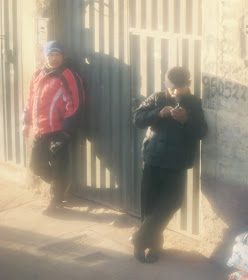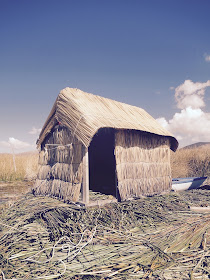Lake Tikicaca has three claims to fame. It’s the largest and deepest lake in
South America. It also earns the
title of highest navigable lake in the world at over 3800 meters high. So imagine going from the Amazon to
this unique wonder just twelve hours by bus back up into the Andes. It wasn’t spectacular when the bus
lacked A/C. Matter fact it was sweltering hot when we left, so I was just in
shorts and a tank top. Since it
was an overnight bus I just knocked out.
Bad move, because I woke up about eight hours later with a bad
itch. This time it wasn't the sand
flies, but bed bugs. Who would
have thought these critters like traveling as much as I do?
I arrived to the city of Puno just as the sun was rising on
the northwest banks of the lake. I
didn’t want to spend anytime in the city, because I had already been in Peru a
month and my visa was about to expire.
I had one more month to see Bolivia and Chile, so I rushed to the lake
port, hoping to catch a boat out to the islands. There are over forty islands on the lake, but I only had
time for two.
The first set of islands I planned to visit was the manmade
floating Uros islands. The Uro
people have been living on these floating islands since BC times. Their islands are made with the buoyant
totora reeds that grow abundantly in the shallows of the lake. The only way to get to them is with a
tour, and it’s quite touristy, so I didn’t mind rushing through getting the
overcrowded Disney cultural tour. However,
it is quite impressive that the Uro people use the reeds to make everything
from boats, to homes, to the islands themselves. And as a bonus, you can eat the inside of the reed. They taste similar to sugarcane.
 |
| Uros Islands |
The indigenous folks here are culturally similar to the
majority Quechua speakers of Peru, but they speak Aymara, which is the majority
indigenous language of Bolivia. In
fact, the lake is shared by the two countries. Since tourism is such a big money maker, nearly all the Uro
people now devote their livelihood to tourism. So if you are looking for the virgin experience of
discovering something few travelers get to experience, you’ll be
disappointed. But like Machu Picchu,
these are places so unique that you’d be a fool to pass it up. The area is gorgeous. Just wait until the gringos move out of
the way before you shoot your pictures.
After about two hours, the tour continued to the large
island eastward. Amantani is
circular in shape with two mountains; appropriately name Pachamama (Mother
Earth and Pachatata (Father Earth).
The only way to visit the island is by doing a homestay so fewer people
actually visit. About five
thousand indigenous people call this place home. It’s more authentic than Uros as well, as the residents rely
mainly on farming quinoa, potatoes, and wheat. Much of the land is terraced where the alpaca graze.
After being greeted by my host family at the port, we took a
tiring twenty-minute walk through terraced farmland and adobe homes speckled along
the mountain. My hosts were a
young married couple in there thirties, with a fourteen year old son, a young
boy of five, and an eleven-year-old girl.
They spoke no English, so I tried my best with the little Spanish I
picked up from my travels. They
lived a humble life, almost entirely sustainable from the land. They built their adobe home in two
months with the help of the community.
No mortgage, just the custom of the community meeting the needs of the individual
and the concept of the “pay it forward” practice when the next community member
needs to build their home. It was interesting to learn that the island got its
electricity under the Fujimori administration, which was surprising because he
was so unpopular with the indigenous communities in these parts. Now, with electricity, the island got
into the business of homestays to generate more income. As the popularity of homestays grew,
they have added more rooms to their home.
AirBnB – ecotourist style!
 |
| family sheep |
Fruit doesn’t grow here because of the altitude so they have
to import fruit from the Amazon.
Meat is a luxury; so all my meals were vegetarian. Potato is a staple, so it wasn’t
unusual to have four types of potatoes with one meal. Munia tea for my drinky drink. For protein, I enjoyed some homemade goat cheese. They offer Coke and Snickers for the
traveler who needs a fix for their sweet tooth. I passed.
 |
| lots of potatoes... meat is a luxury |
It was so interesting so learn what sustainable living looks
like. An attractive wife is a
woman who can spin alpaca or llama wool to make clothes and blankets for her
family. Whatever extra textiles
she spins, she will sell to tourists who visit the island. They eat locally and what can be grown
seasonally. Initially, I was sad
to see the home without many toys or books for the children, but that is me
projecting my childhood them.
Coming from a hyper materialistic and consumer based society like the US,
I’ve been conditioned to expect lots of toys and educational books are
necessary for a child to be happy.
These kids were perfectly happy with what they had. What they lacked materially, was
replaced abundantly with love and kindness that the parents and community gave
selflessly, I’m sure those children were probably more content than most American
kids.
After we got acquainted over lunch, the father led me to the
community futbol field further up the mountain to meet the other tourists also doing
homestays. From there we trekked about
two-hundred and fifty meters to the peak of Pachamama. There sat ruins from the Inca. The Inca revered mountains and the Sun,
so it was perfect for taking in a magnificent sunset overlooking the world’s
highest lake and surrounding six-thousand meter plus snow capped peaks in the
distance.
Homemade potato soup was waiting for me when I returned to
their house. After, dinner, the
wife brought me a pancho and chullo to wear. I didn’t realize she was taking me to a community dance. There, we gathered with the rest of the
villagers and their guests at the community center for some indigenous folk
dancing and music. Of course, beer
was the great equalizer. A bit
cheesy, but I am grateful for the experience that they created for us gringos.
 |
| gathering for the community fiesta |
I slept like a baby under three llama wool blankets in the
subfreezing temperatures. Woke up
early for breakfast with the family for our last meal, and then the wife
escorted me for the forty-minute hike to the port to catch a boat back to the
mainland. It was my last day in
Peru. I was finally off for the
Bolivian border four hours away.
 |
| bus ride to Bolivia... so long Peru.... |
































No comments:
Post a Comment